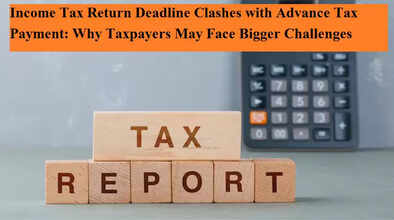Income Tax Return Deadline Clashes with Advance Tax Payment: Why Taxpayers May Face Bigger Challenges

The Income Tax Department has set September 15 as a crucial deadline for two major compliance requirements—filing income tax returns (ITR) and paying the second installment of advance tax for financial year 2025-26. While both are important, having the same deadline is causing stress among taxpayers and chartered accountants.
Why September 15 Matters
Taxpayers are required to file their ITR by September 15. Missing this deadline means filing a belated return, which attracts penalties and additional interest. At the same time, salaried professionals, business owners, and investors must also deposit 45% of their estimated annual tax liability as the second installment of advance tax by the same date. Failure to do so results in penalties under Section 234C of the Income Tax Act.
This overlap of deadlines has left many taxpayers confused and worried, especially with frequent technical glitches on the income tax e-filing portal.
Technical Glitches Add to the Pressure
Chartered accountants across the country report that the e-filing portal is struggling to handle heavy traffic as the deadline nears. Common issues include:
-
Inability to access the Annual Information Statement (AIS) and Form 26AS
-
Errors while generating challans for advance tax payment
-
ITR drafts disappearing after challan payment
-
“Access Denied” errors when selecting ITR forms
According to Himank Singla, founding partner at SBHS & Associates, these repeated issues make it almost impossible for taxpayers to comply on time. “Even after making challan payments, the ITR drafts are not showing. For many users, the portal shows an ‘access denied’ error, making it extremely frustrating,” he said.
Calls for Extension of the Deadline
Several chartered accountants, professional bodies, and even BJP MPs have written to the Finance Ministry, requesting an extension of the ITR filing deadline. Earlier, the due date had already been extended from July 31 to September 15. However, tax experts argue that extending the ITR deadline alone may not solve the problem, since the advance tax deadline remains unchanged.
If the advance tax payment is not deferred or penalties are not waived, taxpayers may still end up paying interest for no fault of their own, simply because the portal is not functioning properly.
Advance Tax Rules Explained
Advance tax is paid in installments to reduce year-end tax burden. By September 15, taxpayers are required to pay at least 45% of their estimated tax liability. For example, if your total tax liability for the year is ₹2 lakh, you must pay ₹90,000 by September 15.
If you fail to do so, interest is charged on the shortfall. For instance, if you had already paid ₹1 lakh in June but failed to pay the September installment, a shortfall of ₹90,000 would attract interest of 1% per month under Section 234C. This could amount to ₹2,700 or more, depending on the delay.
Why This Situation Is Unique
Nitesh Buddhadev, founder of Nimit Consultancy and a practicing chartered accountant, pointed out that the real complication lies in the overlap of deadlines. “Taxpayers are already struggling with AIS access and challan payments. Having both ITR filing and advance tax payment deadlines on the same date is making compliance extremely difficult,” he explained.
What Taxpayers Should Do Now
Until the government announces an extension, experts suggest:
-
Attempt filing returns during non-peak hours to avoid server crashes.
-
Keep all documents—Form 16, AIS, Form 26AS, and challan details—ready in advance.
-
Pay at least the minimum required advance tax to reduce the risk of penalties.
-
Consult a tax professional to ensure accuracy and compliance.
Final Thoughts
With September 15 fast approaching, taxpayers find themselves stuck between system glitches and overlapping deadlines. While the government may consider extending the ITR deadline further, the advance tax payment schedule remains a significant hurdle. Unless both deadlines are addressed simultaneously, taxpayers may continue to face financial penalties despite their best efforts to comply.

